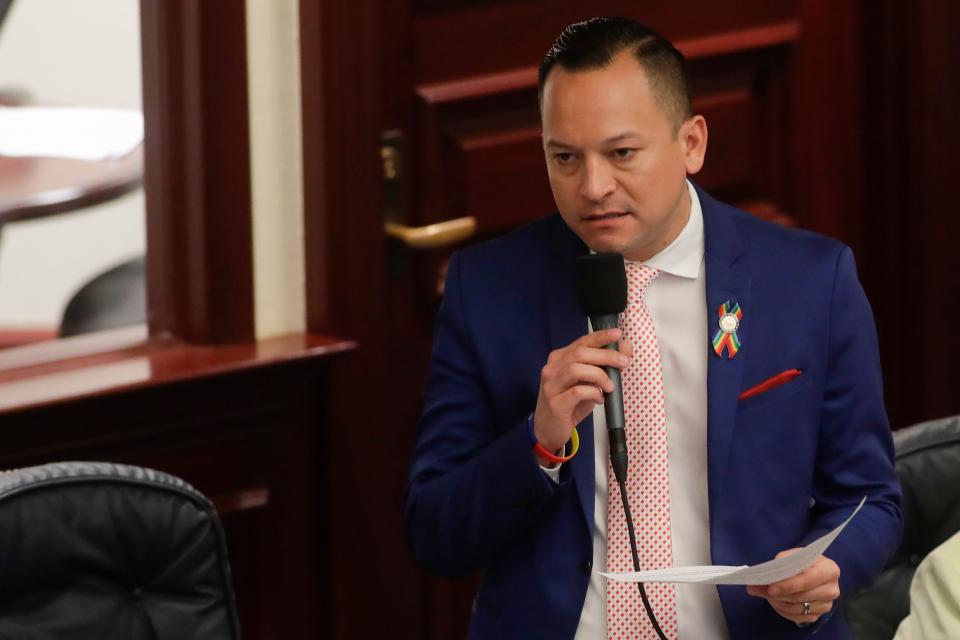Bill to create alternative to security deposit for Florida renters clears first hurdle
A Republican lawmaker says his bill to allow landlords to charge tenants a nonrefundable fee in lieu of an up-front security deposit would help ease the state’s current affordable housing crunch.
But some of his Democratic colleagues in the state Senate say the bill needs a lot more work to protect tenants’ rights before they can support behind the measure.
“I know you are trying to do a good thing, but it needs a little more … parameters,” Sen. Audrey Gibson, D-Jacksonville, told bill sponsor Jim Boyd, R-Bradenton, at the bill's first hearing Tuesday before the Senate Judiciary Committee. Gibson is the panel's vice chair.
Tenants’ rights & natural disasters: What rights do tenants have in the face of climate change and natural disasters? Not many

“It’s almost like a poor tax in my mind," Gibson added. "I know that’s not something you want to do.”
The bill (SB 884) still passed out of committee 7-2 along party lines. The House version (HB 537) by Rep. Jim Mooney, R-Islamorada, is scheduled for its first hearing Wednesday.
Sen. Tina Polsky, D-Boca Raton, said her biggest concern was that the bill didn’t require landlords to deposit the fees in an escrow account or return the fees to the tenants at the end of their lease, as required with security deposits.

“Paying fees and not getting them back at the end troubles me,” Polsky said, suggesting that the monthly fees add up to the cost of a security deposit. Boyd said the fees are an option between landlord and tenant, and the tenant can opt out any time by paying the full security deposit.
None of the fee payments would go toward the security deposit as the bill is currently written. It also doesn't apply toward any costs or damages beyond normal wear and tear.
“It's just additional rent and doesn’t afford the tenant anything,” Polsky said. “I appreciate you can stop paying fees anytime and provide a security deposit, but all that money is gone. There are ways to make it better.”
Rising rent: Sabal Palm community reels as new trailer park owner doubles rent, pushes residents to find new homes
More: Community leaders vow to help Meadows trailer park residents lower lot fee, find new homes

'Different versions of this law in other states have guardrails'
Ida Eskamani, representing the Florida Housing Justice Alliance, said her organization would rather see a monthly fee paid toward a refundable security deposit.
“Different versions of this law in other states have guardrails and consumer protection measures that protect tenants. In Texas, for example, the landlord can’t just pocket the money,” Eskamani said.
The bill also doesn’t set a cap on how much landlords can charge each month or offer any protections against discrimination, she said.
“How would renters file a claim or require landlords to purchase insurance?” she asked. “What are the challenges to getting those dollars back if the renter leaves the apartment or house in perfect condition?”
The legislation does say that if the landlord offers the fee option to one tenant, she has to offer it to all new tenants after its effective date of July 1.
At a time when tenants are being evicted at record rates and seeing rent increases of 20-30% and having to put up an entire month's salary to move into a place, this bill provides no protections for renters, she added.

The state of housing in Florida prompted state Rep. Carlos G. Smith, D-Orlando, to send a letter signed by 24 House and Senate Democrats to Gov. Ron DeSantis to declare a housing state of emergency.
The bill was supported by John Potter and Slater Bayliss, lobbyists for LeaseLock, a company created by a New Yorker who couldn’t afford the upfront costs to move into an apartment.
“Moving costs are the biggest barriers to affordable housing,” Potter said, describing the bill as a free-market solution that avoids regulations like rent control.
Boyd said he wanted to keep it as simple as possible, and just deal with the one issue of codifying something that is already allowed and being practiced in Florida among some landlords.
Polsky asked why the law was needed if the practice is already allowed in Florida. Boyd said it would codify what is currently being practiced by some landlords.
“I have a hard time understanding how this is bad,” Boyd said. “This is helping someone get into a place to live that otherwise might not be affordable. This is a very good solution to what is currently happening in Florida.”
Jeffrey Schweers is a capital bureau reporter for USA TODAY NETWORK-Florida. Contact Schweers at jschweers@gannett.com and follow him on Twitter @jeffschweers.
Subscribe today using the link at the top of the page and never miss a story.
This article originally appeared on Tallahassee Democrat: Nonrefundable monthly fees proposed as alternative to security deposits

